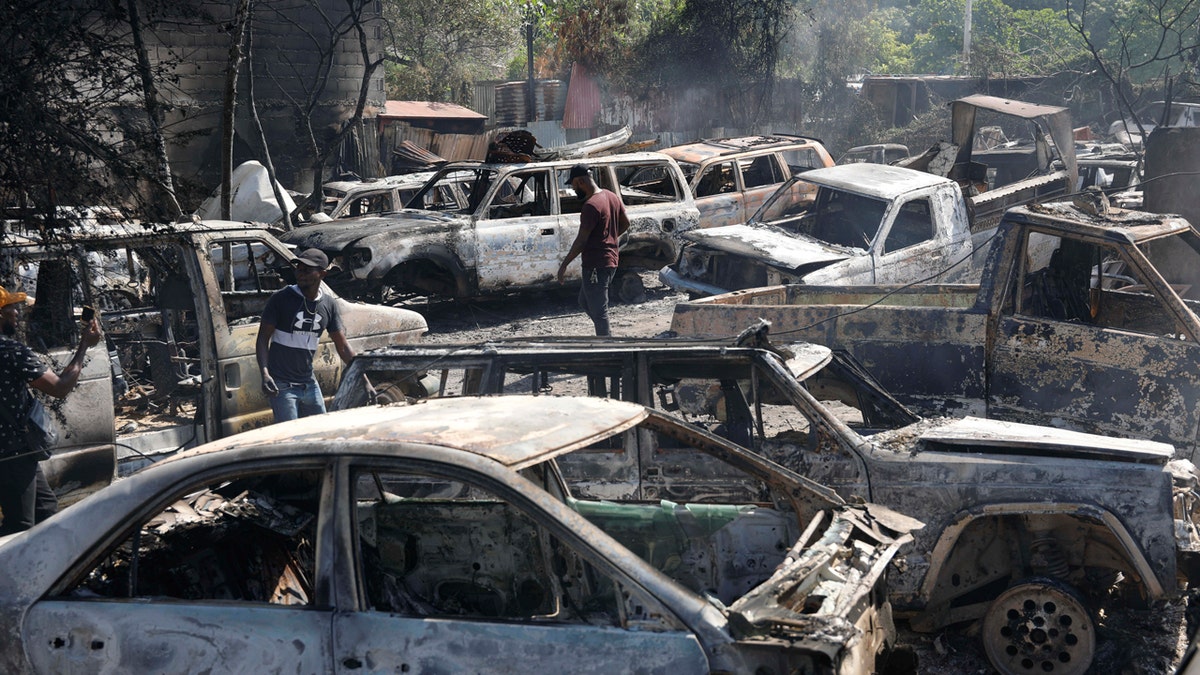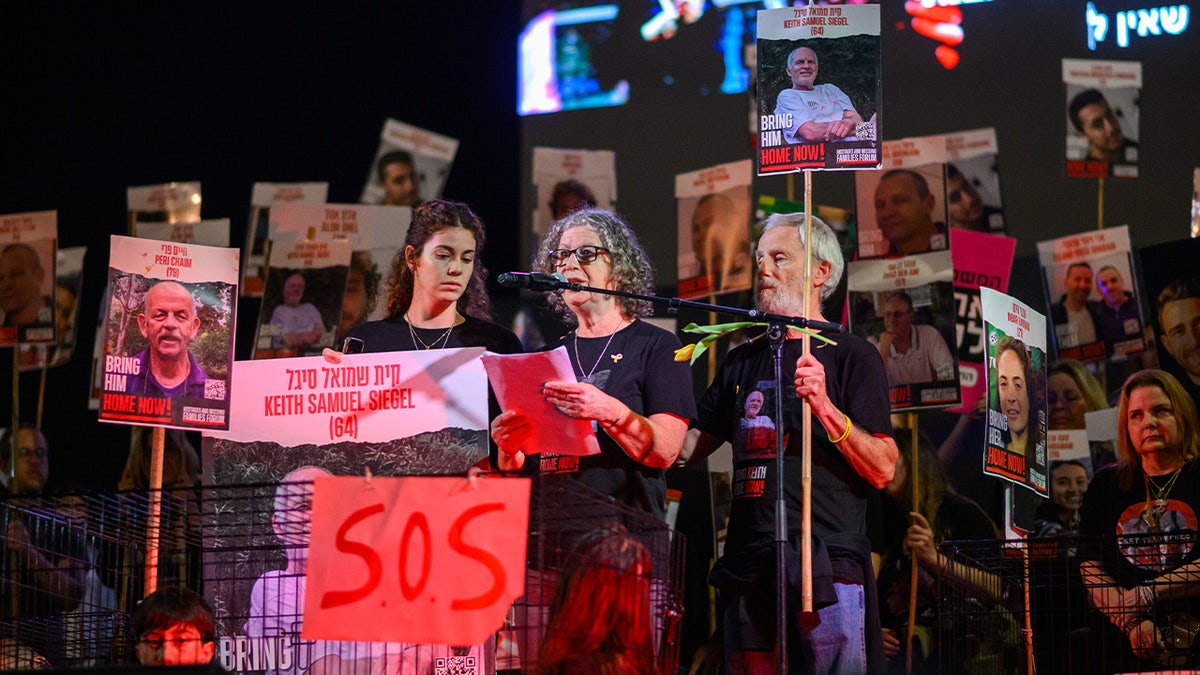INTERNACIONAL
Over 53,000 Haitians flee capital in weeks following gang takeover

- Some 53,125 people fled Port-au-Prince, Haiti, between March 8 and 27, according to a U.N. report released Tuesday.
- Over 60% of them are making their way toward the nation’s rural south, already home to more than 116,000 others taking refuge from the predominantly gang-run capital.
- «Our humanitarian colleagues emphasized that these departments do not have sufficient infrastructure, and host communities do not have sufficient resources, to cope with the large number of people fleeing Port-au-Prince,» U.N. spokesman Stephane Dujarric said of the situation.
More than 53,000 people have fled Haiti’s capital in less than three weeks, the vast majority to escape unrelenting gang violence, according to a United Nations report released Tuesday.
More than 60% are headed to Haiti’s rural southern region, which worries U.N. officials.
«Our humanitarian colleagues emphasized that these departments do not have sufficient infrastructure, and host communities do not have sufficient resources, to cope with the large number of people fleeing Port-au-Prince,» said U.N. spokesman Stephane Dujarric.
FLORIDIANS WORRY ABOUT RELATIVES IN HAITI AS GANG-DOMINATED CHAOS RAGES ON
The southern region already hosts more than 116,000 Haitians who previously left Port-au-Prince, according to the report by the U.N.’s International Organization for Migration.
The exodus from the capital of some 3 million people began shortly after powerful gangs launched a series of attacks on government institutions at the end of February. Gunmen have burned police stations, opened fire on the main international airport that remains closed and stormed Haiti’s two biggest prisons, releasing more than 4,000 inmates.
More than 1,500 people have been reported killed up to March 22, and another 17,000 have been left homeless, according to the U.N.

People look for salvageable pieces from burned cars at a mechanic shop that was set on fire during violence by armed gangs in Port-au-Prince, Haiti, Monday, March 25, 2024. (AP Photo/Odelyn Joseph)
Among the rare travelers trying to head north instead of south from the capital were Marjorie Michelle-Jean, a 42-year-old street vendor, and her two children, ages 4 and 7.
«I want to see them alive,» she said, explaining that stray bullets keep hitting the tin roof of their home. Last week, they tried twice to travel to her hometown of Mirebalais in central Haiti but were forced to turn back because of roadblocks.
«I will definitely try again,» she said. «It’s absolutely not safe in Port-au-Prince.»
Of the 53,125 people who fled Port-au-Prince from March 8-27, nearly 70% already had been forced to abandon their homes and were living with relatives or in crowded and unsanitary makeshift shelters across the capital, the U.N. found.
More than 90% of Haitians leaving the capital have been crowding into buses, risking travel through gang-controlled territory where gang rapes have been reported and gunmen have been known to open fire on public transport.
The violence forced Prime Minister Ariel Henry to announce last month that he would resign once a transitional presidential council is created. Henry was in Kenya to push for the U.N.-backed deployment of a police force from the East African country when the attacks began, and he remains locked out of Haiti.
The transitional council, which will be responsible for choosing a new prime minister and council of ministers, has yet to be formally established.
Meanwhile, the mass migration from Port-au-Prince is expected to continue.
CLICK HERE TO GET THE FOX NEWS APP
But Gary Dorval, 29, who was among a handful of people joining a demonstration on Tuesday, said he wants to stay until a new government is installed: «I want to be part of the change.»
INTERNACIONAL
Wife of US hostage Keith Siegel pleads for holiday miracle: ‘we need to get them back’

FIRST ON FOX – Aviva Siegel, the wife of American hostage Kieth Siegel and a former hostage herself, is pleading with everyone and anyone involved in the hostage negotiations to get her husband, and the others, freed from Hamas captivity after they have spent more than 440 days in deplorable conditions.
«Hamas released a video of Keith, and I just saw the picture,» Aviva told Fox News Digital in an emotional interview in reference to a video Hamas released in April. «He looks terrible. His bones are out, and you can see that he’s lost a lot of weight.
«He doesn’t look like himself. And I’m just so worried about him, because so [many] days and minutes have passed since that video that we received,» she said. «I just don’t know what kind of Keith that we’re going to get back.»
Keith Samuel Siegel, 64, remains hostage in Gaza by Hamas (Hostage Family Forum)
7 US HOSTAGES STILL HELD BY HAMAS TERRORISTS AS FAMILIES PLEAD FOR THEIR RELEASE: ‘THIS IS URGENT’
«I’m worried about all the hostages, because the conditions that they are in are the worst conditions that any human being could go through,» Aviva said. «I was there. I touched death. I know what it feels being underneath the ground with no oxygen.
«Keith and I were just left there. We were left there to die,» she added.
Aviva and her husband of, at the time 42 years, were brutally abducted from their home in Kibbutz Kfar Aza by Hamas on Oct. 7, 2023, and held together for 51 days before she was released in the November 2023 hostage exchange after suffering from a stomach infection that left her incredibly ill.
She has since tirelessly fought for Kieth’s release, meeting with top officials in the U.S. and Israel, traveling to the United States nine times in the last year and becoming a prominent advocate for the hostages.
«I just hope that he’s with other people from Israel, and if he has them, he’s going to be okay,» Aviva said. «He’s just the person that will make them feel that they’re together. That’s what he did when I was there – he was 100% for me and the hostages that we were with.»

TEL AVIV, ISRAEL – MARCH 30: Released hostage Aviva Siegel, wife of hostage Keith Siegel, speaks during the final weekly ‘bring them home now’ rally on March 30, 2024 in Tel Aviv, Israel. According to the families of hostages forum, this would be the last week a rally is held at ‘hostage square’ citing that the government is not serious about negotiations and instead will be protesting in front of the Knesset from now on. (Photo by Alexi Rosenfeld/Getty Images)
«If you get kidnapped, get kidnapped with Keith, because he was outstanding to everybody. He was strong for all of us. And I’m sure that he’s keeping strong and keeping his hope to come out,» she said.
Aviva recounted their last moments together before they were separated ahead of her release, telling Fox News Digital, «When I left him, I told him to be the strongest – that he needs to be strong for me, and I’ll be strong for him.»
PALESTINIAN AUTHORITY UNDER PRESSURE AMID RISING RESISTANCE, POPULARITY OF IRAN-BACKED TERROR GROUPS
Top security officials from the U.S., Egypt, and Qatar have been pushing Israel and Hamas to agree to a cease-fire and the return of hostages.
Reports on Thursday suggested that negotiators are pushing for a 42-day cease-fire in which 34 of the at least 50 hostages still assessed to be alive, could be exchanged.
Hamas is also believed to continue to hold at least 38 who were taken hostage and then killed while in captivity, along with at least seven who are believed to have been killed on Oct. 7, 2023 and then taken into Gaza.
Though all the hostages are believed to have been held in deplorable conditions, the children, women – including the female IDF soldiers – the sick and the elderly have reportedly been front listed to be freed first in exchange for Hamas terrorists currently imprisoned.
«I’m keeping my hope and holding on and just waiting – waiting to hug Keith, and waiting for all the families, to get their families back,» Aviva said. «We need to get them back.»
Aviva said she dreams of the moment that she gets to hug her husband again and watch their grandchildren «jump into his arms.»
«We’ll be the happiest people on Earth,» she said. «All the hostages, I can’t imagine them coming home. It’ll be just the happiest moment for all of the families. We need it to happen.»
Reports in recent weeks suggest there is an increased sense of optimism in bringing home the hostages, but Secretary of State Antony Blinken urged some caution when speaking with MSNBC Morning Joe on Thursday when he said, «We are encouraged because this should happen, and it should happen because Hamas is at a point where the cavalry it thought might come to the rescue isn’t coming to the rescue, [Hezbollah’s] not coming to the rescue, [Iran’s] not coming to the rescue.»

CLICK HERE TO GET THE FOX NEWS APP
«In the absence of that, I think the pressure is on Hamas to finally get to yes,» he added. «But look, I think we also have to be very realistic. We’ve had these Lucy and the football moments several times over the last months where we thought we were there, and the football gets pulled away.
«The real question is: Is Hamas capable of making a decision and getting to yes? We’ve been fanning out with every possible partner on this to try to get the necessary pressure exerted on Hamas to say yes,» Blinken added.
-
POLITICA3 días ago
Patricia Bullrich le respondió a Victoria Villarruel tras las críticas por el gendarme detenido en Venezuela
-
POLITICA2 días ago
El descargo de Longobardi tras su salida de Radio Rivadavia: «Me hizo acordar cuando Cristina ejecutó mi despido en Radio 10»
-
POLITICA3 días ago
La Corte Suprema declaró inconstitucional la reelección indefinida en Formosa
-
INTERNACIONAL2 días ago
Atropello múltiple en un mercado de Navidad en Alemania: al menos dos muertos y más de 60 heridos
-
POLITICA1 día ago
Guillermo Castello: «Kicillof está utilizando la caja de la provincia para posicionarse políticamente»
-
POLITICA11 horas ago
Nisman: el Gobierno acepta el pedido del fiscal y levanta el secreto sobre los espías inorgánicos de la SIDE y el Ejército








































